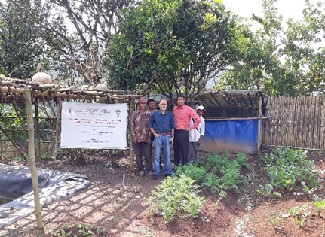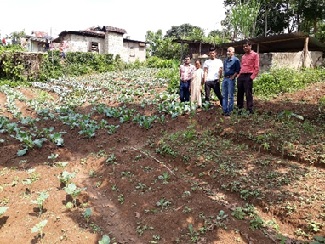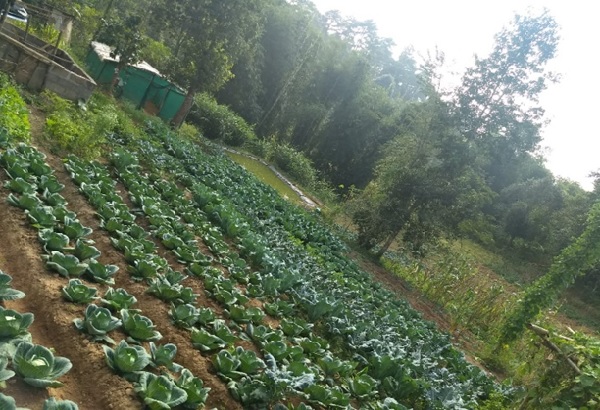Diagnostic Visit of Integrated Farming system models of village Mysain, Ri-Bhoi District, Meghalaya
A team comprised of Dr. Jayanta Layek, Dr. Samarendra Hazarika and Dr. Krishnappa R from ICAR Research Complex, Umiam conducted a diagnostic field visit in integrated Organic Farming System (IOFS) models of Shri Jrill Makroh (area=0.21 ha) and Mrs. Hynniew Rynghang (0.203 ha) in Village Mynsain, Ri-Bhoi District, Meghalaya on 9th October, 2018. The models were developed under the NPOF with active financial support of TSP fund from ICAR Research Complex for NEH Region, Umiam. The IOFS models comprises of different enterprises such as cereals (maize,), pulses (pea), vegetable crops (cabbage, broccoli, cauliflower, French bean, carrot, okra, brinjal, chili, coriander, lai patta etc.), fruits (papaya, Assam lemon), piggery unit, poultry, low cost polyhouse and a water harvesting unit (Jalkund). The Jalkund of 40-45 m2 area with average depth of 1.0 m is an important component of the IOFS model for life saving irrigation and aquaculture. Climbing vegetables such as pumpkin and bottle gourd etc., were grown on a structure created above jalkund in one side of the pond dyke for vertical intensification. During the visit, the team observed the moisture stress and nutrient deficiency symptoms in cole crops, blister beetle attack in okra, cabbage butterfly in cole crops, anthracnose in French bean, etc. The scientists explained them the role of compost including vermicomposting in details in enhancing the soil health and crop productivity especially under organic farming. Vermibeds can produce about 1200 kgs to 1500 kgs of Vermicompost and can be adopted by a small farmer with using manure and household organic wastes. Crop residues, weed biomass and agricultural wastes are advised to collect by the farmers and filled in the vermibeds for decomposition processes. Proper application of manure and vermicompost for optimum growth of vegetables is very much important. The role of manure and lime application before cultivation of crops under organic farming is advocated for raising the soil pH and availability of nutrients to crops. Crop rotation and inclusion of legumes like groundnut, soybean, pea etc, were advised to enrich the soil fertility and reducing the pest load. Roof water harvesting from the nearby house and channelizing the water to the jalkund is also suggested for giving life saving irrigations to vegetables grown under the models especially for the winter months. Organic means of insect pest and disease management by use of neem oil, Beauveria bassiana, Trichoderma etc. were explained by the team. Possible helps from the ICAR side by giving some inputs like seeds, organic pesticides and technological backup is assured to the farmers for making the models more remunerative.
Scientists at the diagnostic visit of IOFS model (9th October 2018)
Picture of the IOFS model five weeks after the diagnostic visit (14th November 2018)
Team member visited the models
1. Dr. Jayanta Layek, Scientists (Agronomy) and PI, NPOF Project
2. Dr. Samarendra Hazarika, Principal Scientist (Soil Science) and Head, NRM Division
3. Dr. Krishnappa R, Scientist (Plant Physiology)
4. Dr. Utpal Dey, SRF, NPOF Project (PhD in Plant Pathology)


